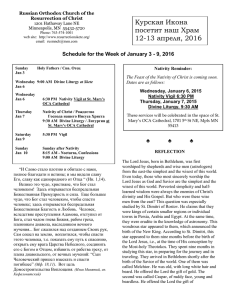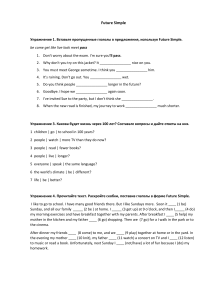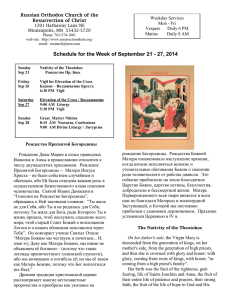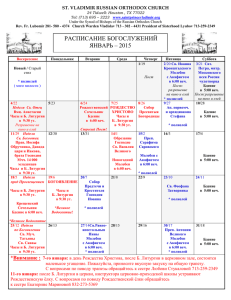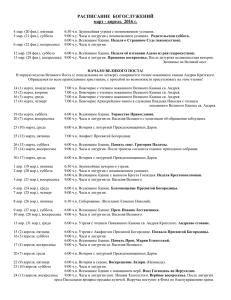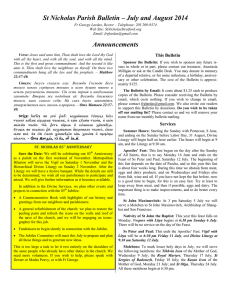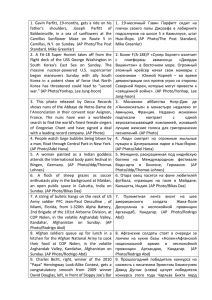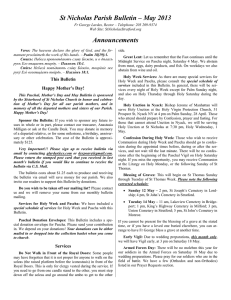Schedule for the Week of June 21 - Russian Orthodox Church and
реклама
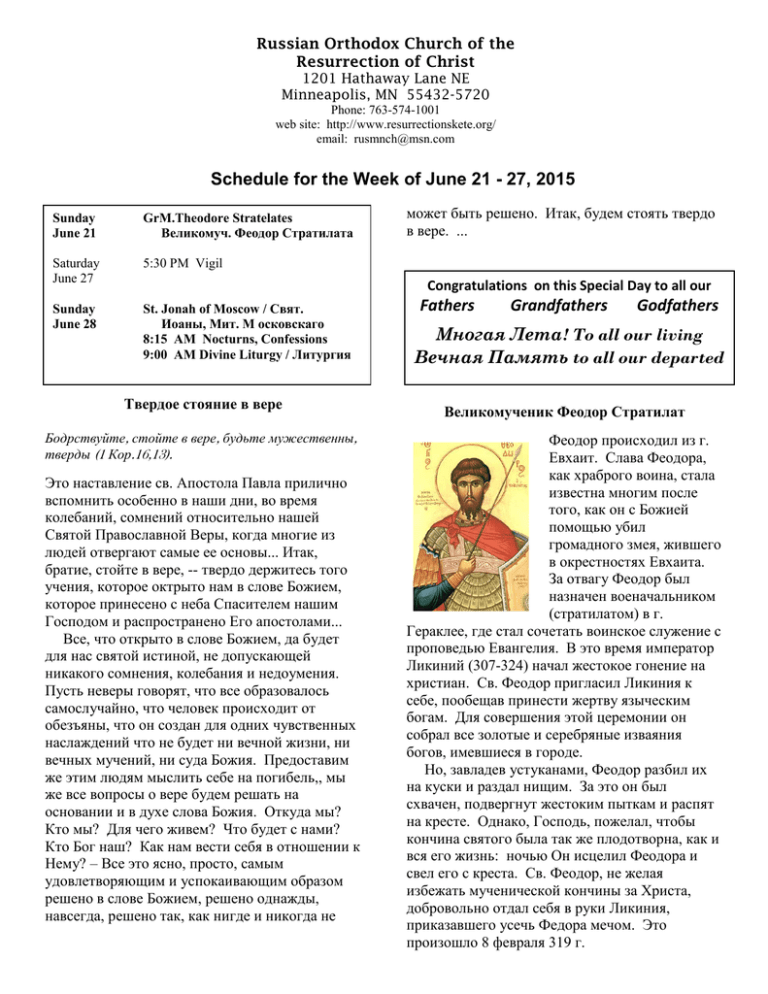
Russian Orthodox Church of the Resurrection of Christ 1201 Hathaway Lane NE Minneapolis, MN 55432-5720 Phone: 763-574-1001 web site: http://www.resurrectionskete.org/ email: rusmnch@msn.com Schedule for the Week of June 21 - 27, 2015 Sunday June 21 GrM.Theodore Stratelates Великомуч. Феодор Стратилата Saturday June 27 5:30 PM Vigil Sunday June 28 St. Jonah of Moscow / Свят. Иоаны, Мит. М осковскаго 8:15 AM Nocturns, Confessions 9:00 AM Divine Liturgy / Литургия может быть решено. Итак, будем стоять твердо в вере. ... Congratulations on this Special Day to all our Твердое стояние в вере Бодрствуйте, стойте в вере, будьте мужественны, тверды (1 Кор.16,13). Это наставление св. Апостола Павла прилично вспомнить особенно в наши дни, во время колебаний, сомнений относительно нашей Святой Православной Веры, когда многие из людей отвергают самые ее основы... Итак, братие, стойте в вере, -- твердо держитесь того учения, которое октрыто нам в слове Божием, которое принесено с неба Спасителем нашим Господом и распространено Его апостолами... Все, что открыто в слове Божием, да будет для нас святой истиной, не допускающей никакого сомнения, колебания и недоумения. Пусть неверы говорят, что все образовалось самослучайно, что человек происходит от обезъяны, что он создан для одних чувственных наслаждений что не будет ни вечной жизни, ни вечных мучений, ни суда Божия. Предоставим же этим людям мыслить себе на погибель,, мы же все вопросы о вере будем решать на основании и в духе слова Божия. Откуда мы? Кто мы? Для чего живем? Что будет с нами? Кто Бог наш? Как нам вести себя в отношении к Нему? – Все это ясно, просто, самым удовлетворяющим и успокаивающим образом решено в слове Божием, решено однажды, навсегда, решено так, как нигде и никогда не Fathers Grandfathers Godfathers Многая Лета! To all our living Вечная Память to all our departed Великомученик Феодор Стратилат Феодор происходил из г. Евхаит. Слава Феодора, как храброго воина, стала известна многим после того, как он с Божией помощью убил громадного змея, жившего в окрестностях Евхаита. За отвагу Феодор был назначен военачальником (стратилатом) в г. Гераклее, где стал сочетать воинское служение с проповедью Евангелия. В это время император Ликиний (307-324) начал жестокое гонение на христиан. Св. Феодор пригласил Ликиния к себе, пообещав принести жертву языческим богам. Для совершения этой церемонии он собрал все золотые и серебряные изваяния богов, имевшиеся в городе. Но, завладев устуканами, Феодор разбил их на куски и раздал нищим. За это он был схвачен, подвергнут жестоким пыткам и распят на кресте. Однако, Господь, пожелал, чтобы кончина святого была так же плодотворна, как и вся его жизнь: ночью Он исцелил Феодора и свел его с креста. Св. Феодор, не желая избежать мученической кончины за Христа, добровольно отдал себя в руки Ликиния, приказавшего усечь Федора мечом. Это произошло 8 февраля 319 г. For too many people, Orthodox among them, Sunday is no longer observed with attendance at Divine Liturgy and refraining from work. Is it wrong to throw the clothes into the automatic washer? Is it wrong to dress sloppily for Church service? How about sewing on Sunday? Is it really wrong to use scissors on Sundays, as our babas insist? As early as 1491 BC, before Christ was born, we are told in Exodus 20 that God told Moses to tell his people that “Remember to keep the sabbath day, to keep it holy. Six days shalt thou labor and do all thy work; but the seventh day is the Sabbath of the Lord thy God. . . for in six days the Lord made heaven and earth, the sea and all that is in them, and rested the seventh day: Wherefore the Lord blessed the Sabbath day and hallowed it.” Eusebius in the year 341 wrote about attendance at Divine Liturgy: “We, the children of the New Testament, celebrate our Pascha every Sunday, being established by the Body of the Savior, and always partaking of the Blood of the Lamb.” According to Tertullian, attendance at the Divine Liturgy was regarded as customary duty for all adult Christians by the 3rd century. Following the ancient custom of Jews and pagan Romans, the Christians put on their best clothes for attendance at worship. This tradition became universal among all Christian nations and has survived until recently, even among those who no longer attend Sunday services. Concerning Sunday rest, the Church naturally avoided what Christ had condemned as a narrow and unreasonable interpretation of the law, as seen in Mark 2:27. But from the beginning the law was observed through the common conviction of Christians that all work must be discontinued which would make attendance of divine worship impossible or impede one’s spiritual contemplation and tranquility on Sunday. The Council of Laodicea held around 343 in its Canon 19 stressed the obligation of Sunday rest for all Christians, as far as possible. The duty of relieving slaves and servants from work so that they could attend worship and instruction, both in the morning and in the afternoon, was universal. As early as the 4th century Christian masters seem to have anticipated our modern weekend practices, for slaves were free from their duties even on Saturday, in preparation for Sunday. The law of Sunday rest imposed the further obligation of abstaining from servile (non-essential) work in household, farm, trade and industry… Professional people, merchants, and civil officials also were required to abstain from their regular work; however there are many exceptions because of necessity, such as duties of doctors, nurses, firemen, etc. The Church has always stressed the positive ideal of Sunday observance. The Resurrection Day, after public worship, should be spent in works of piety and charity, in peaceful relaxation, in the happy union of family life. The first Christian emperor, Constantine, initiated the practice which has continued up to recent times, of honoring Sunday as the Day of the Lord by state laws and regulations. In 321 he forbade the sitting of courts and any legal action on Sunday. He also allowed all Christian soldiers to be excused from duty in order to attend Sunday services, while the pagan soldiers had to assemble in camp, without arms, and offer a prayer which we would now call nondenominational. As more and more laws allowing rest and prayer on Sunday are being stricken from the books, it does not give Christians license to forget what God told us through Moses: “the seventh day is the sabbath of the Lord our God.” (from The Orthodox Herald) ♣ ♣ ♣ Should you be sorrowful over your sins, or be moved, or shed a tear, or sigh, -- your sighing will not be hidden from Him. St. Simeon tells us: "Nothing is hidden from Thee, my God, my Creator, my Redeemer, neither a teardrop, nor a part of a drop." St. John Chrysostom states: "If you only lament over your sins, He will take it as a reason for your salvation." Venerable Elder Moses (Putilov) of Optina
